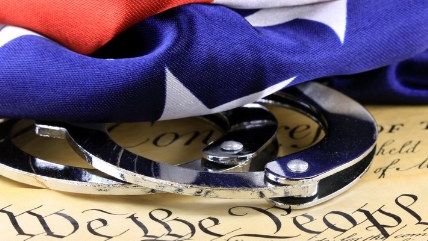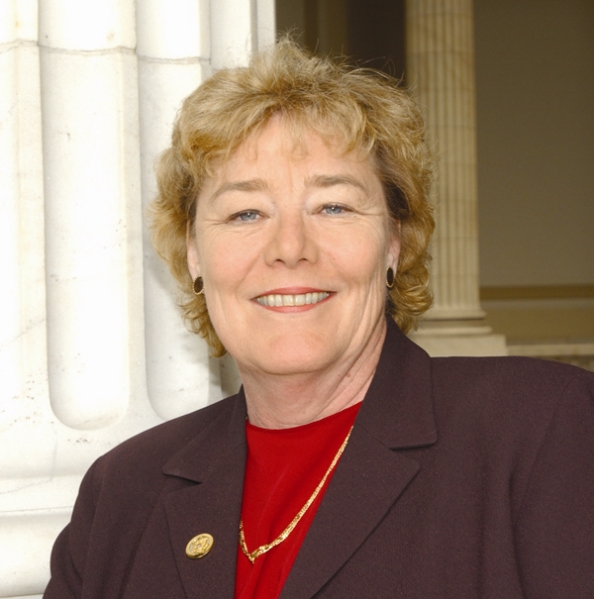The Fourth Amendment Gets Its Own House Caucus to Demand Its Respect
Coalition of 25 bipartisan lawmakers organizes against unwarranted surveillance and data collection.


Does Congress actually need a special caucus to advocate on behalf of a civil liberty that is spelled out in the Constitution's Bill of Rights?
For 25 lawmakers in the House of Representatives, when it comes to the Fourth Amendment, the answer is increasingly "yes." On Wednesday, the Hill saw the formal launch of the Fourth Amendment Caucus, a bipartisan coalition (nearly evenly divided between the two parties) of those who are concerned about the degradation of the right of Americans to protect their communications and personal information from unwarranted government searches.
Edward Snowden has become a household name since he revealed the United States government was secretly collecting massive amounts of data from its citizens own communications without their knowledge, all ostensibly to help fight terrorism. Snowden's decision to blow the whistle on the behavior of the National Security Agency (NSA) was intended, in part, to highlight the increasing degredation of the citizen protections of the Fourth Amendment.
And yet, in the wake of his revelations and the public outrage, agencies like the NSA and FBI continue to push for more authority to collect data about American citizens without having to turn to warrants. The FBI wants to increase the data it can gather through the use of secret National Security Letters. An attempt to expand the authority of the Patriot Act to get banks to share data from its customers with the government to fight crimes beyond terrorism and money-laundering was just defeated in the House.
Two of the House members who were vocal about stopping that Patriot Act expansion, Reps. Justin Amash (R-Mich.) and Thomas Massie (R-Ky.), are members of this new Fourth Amendment Caucus. The caucus was the brainchild of Rep. Ted Poe (R-Texas) a strong supporter of requiring better citizen privacy protections and for the NSA and feds to respect the restrictions the Fourth Amendment puts in place when investigating crime and terrorism. Poe asked Rep. Zoe Lofgren (D-Calif.) to help chair the caucus. Lofgren recently worked with Massie to attempt to pass legislation to try to force the feds to get warrants to access collected data on American citizens. Their efforts failed. The two are also strong voices in trying to protect tech companies from federal efforts to force them to make "back doors" in their software or otherwise weaken their encryption to assist authorities in investigations.
Other members of Congress known for speaking out on the Fourth Amendment are also on the caucus. Rep. Jared Polis (D-Colo.), who has been trying to change federal law to require warrants to access old emails, is on the caucus. Rep. Ted Lieu (D-Calif.), who blatantly once told a district attorney with a dim view of encryption to "follow the damn Constitution," is in the caucus. Rep. John Lewis (D-Ga.), himself once a target of federal surveillance during the civil rights movement, is in the caucus.
After the caucus formally rolled out Wednesday, Lofgren explained to Reason that these legislators already work together on Fourth Amendment issues, but putting together a caucus allowed for a more formal structure for them to move forward together in the broad sense as a team. She sees the caucus as a necessary response to the push from authorities to collect more data and the unwillingness of some to make sure the Fourth Amendment retains its teeth.
"Everybody says they're for the Constitution," Lofgren says, "but when you look at the application is when you see the problem." There's been a tendency to hope for the courts to pull back on overreach by the FBI and NSA in collecting citizen data, but Lofgren notes that the legislative branch has a role to play, particularly given how the courts have been responding to challenges.
"The legislative branch has equal responsibility," Lofgren says. "We have old legal doctrines that don't fit very well in a digital age. … These are issues we hope Congress can address."
The most significant example of the "old legal doctrines" Lofgren refers to is the concept, established by Supreme Court precedent, that citizen data held by third parties is not granted the same Fourth Amendment protections as information and records held by the citizens themselves. The precedent dates back to the 1970s in reference to information that citizens voluntarily give up to phone companies (such as whom they are calling) and other businesses. But then Americans more easily knew when and who they were giving up their information to and how much information they were passing along. In the era of the internet and smartphones, much more information about American citizens has been digitized, collected, and stored by third parties. And yet, despite many legal challenges, that doctrine remains the current precedent.
The caucus won't be going it alone attempting to tackle Fourth Amendment issues. Operating independently from the caucus but working with them is the Fourth Amendment Advisory Committee. Their goal will be to advise the caucus and other lawmakers in areas where Fourth Amendment issues intersect with the law and most particularly technology. The steering board for the advisory committee includes a cross-section of tech and civil liberties experts from across the cultural and ideological spectrum.
Sean Vitka, director of the committee, organized and led a panel discussion on Fourth Amendment issues as part of the launch of the caucus. He later told Reason that the committee won't be lobbying, but will be bringing in experts to help advise legislators.
"From the outside," Vitka says, "it's pretty apparent that our leaders on the Hill are stronger when they act together. The organizing benefits and the collective power of the caucus provides them many more opportunities to do that."
The caucus's biggest challenge? Vitka predicts it's facing lawmakers or officials who have pro-surveillance attitudes who attempt to use fear to win the day, regardless of the context.
"It's defeating this totally [false idea] that surveillance always makes us safer," Vitka says. "It's all of these false notions that people rely on." In the wake of the Orlando shooting, lawmakers rejected Massie and Lofgren's efforts to require warrants to access Americans' metadata by claiming it would keep them from searching data gathered from shooter Omar Mateen. Massie noted at the time that obviously the FBI would be able to easily prove probable cause to get a warrant to access the information, but fear ruled the day, and the amendment was defeated.
Vitka also noted that the caucus was needed not just for pushing Fourth Amendment protections forward but also having enough of a structure to try to navigate around a Congressional establishment that doesn't seem, in either party, to be terribly interested in calls for reform and even looks for ways to expand government surveillance authority, all while the public is demanding more privacy. Vitka points to the fate of the Cybersecurity Information Sharing Act (CISA). This legislation, which encourages private companies to share customer data with the federal government to fight crime (and also immunizes these companies from lawsuits over privacy breaches) was heavily criticized as being an unnecessary tool that would serve to expand federal surveillance. It couldn't pass on its own, so it was very quietly renamed the Cybersecurity Act of 2015 and shoved into the omnibus spending bill that passed last December.
Congress has dozens of caucuses on various areas of interest. Lofgren says their intent is for the Fourth Amendment Caucus to be one of the more active ones. A full list of the caucus's members can be found here. And below, watch the introduction of the caucus and a panel discussion on Fourth Amendment issues held Wednesday in D.C.


Show Comments (14)